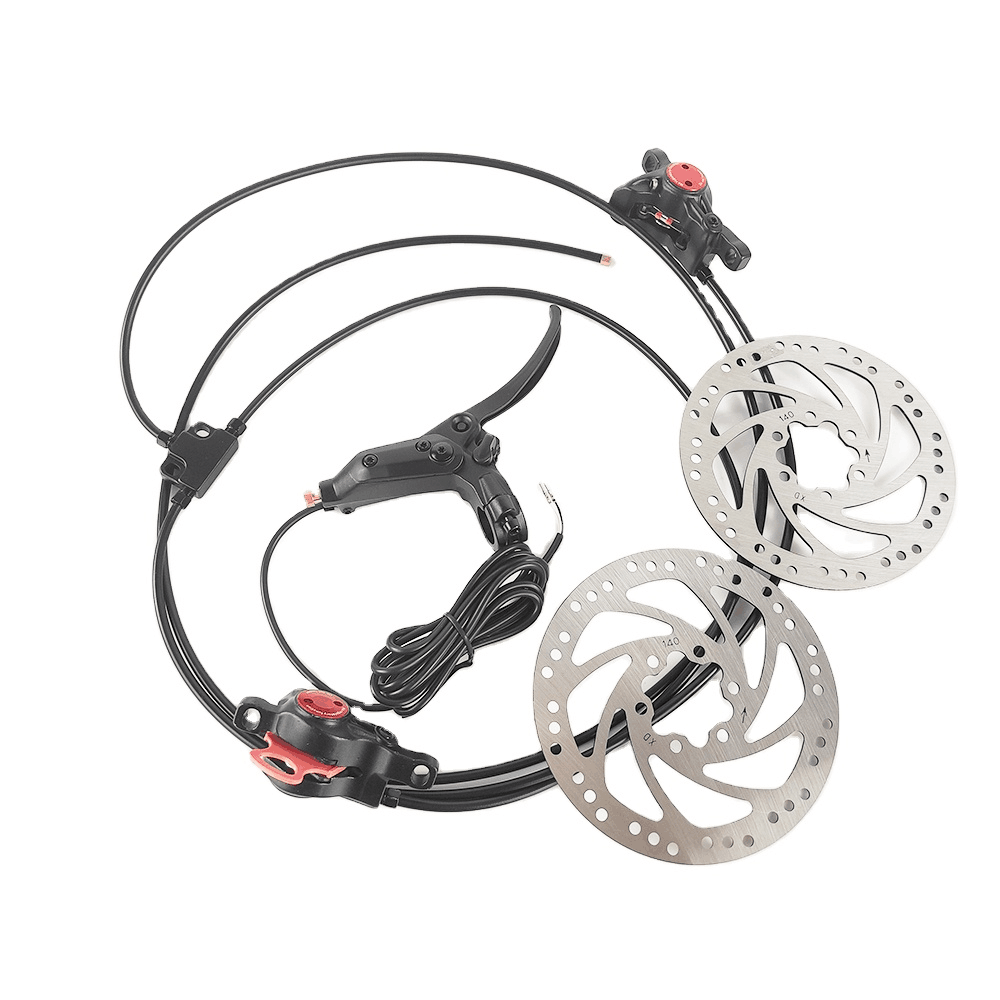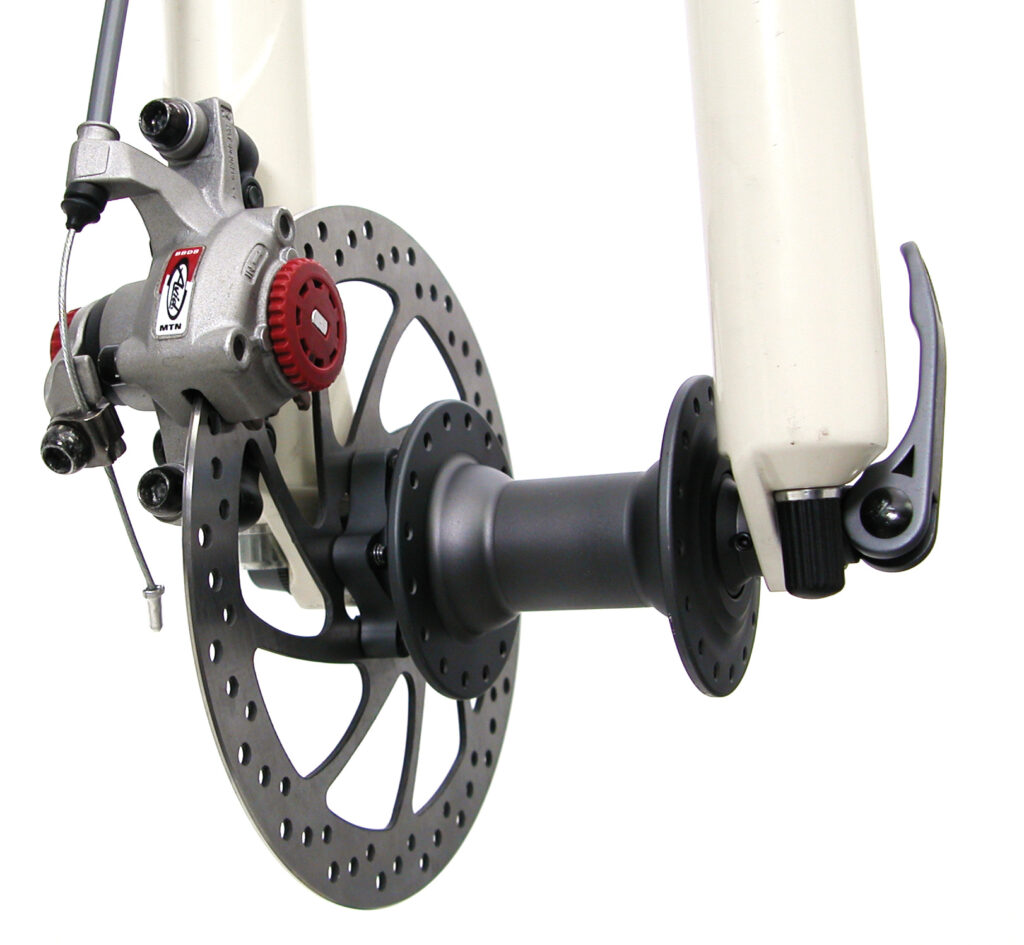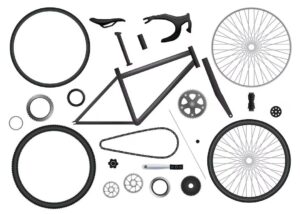Em ciclismo e engenharia automotiva, O debate entre freio hidráulico versus freio mecânico tem sido um tópico de interesse e contenção. Cada sistema de freios oferece vantagens e desvantagens distintas, Tornando isso crucial para entusiastas e profissionais entender suas diferenças e aplicações.

O que são freios a disco hidráulicos?

Freios de disco hidráulico são sistemas de frenagem avançados que utilizam pressão do líquido hidráulico para transmitir força da alavanca do freio ao mecanismo de frenagem na roda, fornecendo poder de parada superior, modulação, e confiabilidade, especialmente em condições exigentes. Por exemplo, Shine logo TP-150049E é o dos melhores freios a disco hidráulicos do orçamento para triciclos elétricos de carga. Possui alta dispersão de calor e tolerância ao calor.
Como os freios hidráulicos funcionam?
Os freios hidráulicos operam através de um sistema fechado de tubos e cilindros cheios de fluido. Quando a alavanca do freio é espremida, Ele exerce força em um pistão dentro do cilindro mestre localizado perto do guidão. Esta ação aumenta a pressão do fluido de freio dentro do cilindro mestre.
O fluido de freio pressurizado é então forçado através de mangueiras ou tubos para a pinça de freio localizada ao volante. Dentro da pinça, Alguns pistões também contêm fluido de freio. À medida que o fluido pressurizado atinge o pinça, empurra esses pistões para fora.
O movimento externo dos pistões causa as pastilhas de freio, que estão situados dentro da pinça, para espremer contra o rotor (no caso de freios a disco) ou a borda (no caso de freios de aro). Este contato gera atrito entre as almofadas e a superfície de frenagem, que diminui ou interrompe a rotação da roda.
Componentes de freios hidráulicos
Os freios hidráulicos consistem em vários componentes -chave que funcionam juntos sem problemas:
Fluido de freio
O sistema hidráulico depende de fluido de freio especialmente formulado, muitas vezes baseado em glicol, que é não compacível e transfere a pressão de maneira eficaz.
Cilindro mestre
O cilindro mestre converte força mecânica da alavanca do freio em pressão hidráulica, Iniciando o processo de frenagem.
Pinça de freio
A pinça de freio abriga pistões que pressionam as pastilhas de freio contra o rotor, converter pressão hidráulica em força mecânica para parar a roda.
Vantagens de freios hidráulicos
Os freios hidráulicos oferecem várias vantagens sobre as contrapartes mecânicas:
- Desempenho aprimorado: Fornece modulação mais precisa e poder de parada mais forte.
- Melhor gerenciamento de calor: Menos propenso ao desbotamento do freio sob uso pesado contínuo.
- Manutenção mínima: Almofadas auto-ajustadas e sistema selado reduzem a manutenção.
Desvantagens dos freios hidráulicos
Apesar de suas vantagens, Os freios hidráulicos têm algumas limitações:
- Complexidade: Requer ferramentas especializadas e conhecimento para manutenção e reparo.
- Possíveis problemas fluidos: Vulnerável a vazamentos de fluidos que podem afetar o desempenho.
- Custo: Os custos iniciais de configuração e reparo são maiores em comparação com os freios mecânicos.
O que são freios mecânicos?

Freios mecânicos são sistemas de frenagem que usam mecanismos físicos, como cabos, transmitir força da alavanca do freio para o mecanismo de frenagem ao volante, em oposição aos freios hidráulicos que usam pressão de fluido para esse fim.
Como os freios mecânicos funcionam?
Os freios mecânicos operam através de um sistema de cabos e alavancas para aplicar força de frenagem. Quando o cavaleiro puxa a alavanca do freio, Um cabo conectado a ele é tensionado. Este cabo vai da alavanca para o mecanismo de frenagem ao volante.
Na extremidade da roda, O cabo está conectado a um mecanismo que move as pastilhas de freio ou os sapatos em contato com a superfície de frenagem. Por exemplo, em freios a disco, Puxar o cabo faz com que a pinça de freio aperte as pastilhas de freio contra o rotor de disco, gerando atrito que diminui a velocidade ou para a roda. Em freios de aro, O cabo puxa um mecanismo que pressiona as pastilhas de freio contra a borda da roda, alcançar o mesmo efeito de frenagem através do atrito.
A quantidade de força de frenagem aplicada é diretamente proporcional à força exercida na alavanca do freio pelo piloto. Os freios mecânicos são conhecidos por sua simplicidade e confiabilidade, Como eles não dependem de sistemas hidráulicos ou fluidos complexos. No entanto, Eles podem exigir ajustes periódicos para manter o desempenho ideal, Como os cabos podem se esticar com o tempo que afeta a eficiência da frenagem.
Componentes de freios mecânicos
Os freios mecânicos consistem em componentes diretos projetados para vantagem mecânica:
Cabo de freio
Um cabo de aço durável conecta a alavanca de freio ao mecanismo de frenagem, Força de transmissão quando a alavanca é espremida.
Alavanca de freio
A alavanca de freio serve como o ponto de contato do piloto, converter força mecânica em tensão do cabo.
Pastilhas de freio
Os freios mecânicos empregam pastilhas de freio que pressionam contra o rotor ou aro, gerando atrito para desacelerar ou parar a roda.
Vantagens de freios mecânicos
Os freios mecânicos oferecem vantagens distintas adequadas para determinadas aplicações:
- Simplicidade: Configuração e manutenção mais fáceis sem ferramentas especializadas.
- Confiabilidade: Menos propenso a questões como vazamentos de fluidos ou insuficiência hidráulica.
- Econômico: Menor custo inicial e reparos mais fáceis contribuem para a acessibilidade.
Desvantagens de freios mecânicos
No entanto, Os freios mecânicos também têm limitações que podem afetar o desempenho:
- Menos poder: Geralmente fornece menos poder de parada em comparação aos sistemas hidráulicos.
- Ajuste manual: Requer ajuste periódico de cabos e almofadas.
- Suscetível ao desgaste: Alongamento e desgaste do cabo ao longo do tempo podem afetar a eficiência da frenagem.
Freios hidráulicos vs mecânicos: Uma análise comparativa
Ao escolher entre freios a disco hidráulicos e mecânicos, Vários fatores devem ser considerados para determinar a opção mais adequada para necessidades específicas. Aqui está uma análise comparativa dos freios de disco hidráulico e mecânico apresentados em um formato de gráfico:
| Aspecto | Freios de disco hidráulico | Freios a disco mecânicos |
| Princípio da operação | Usa o líquido hidráulico para transferir força; Mecanismo acionado por pistão | Usa cabos e alavancagem mecânica para transferir força |
| Modulação e controle | Excelente modulação e controle preciso | A modulação pode variar; pode exigir mais esforço para controle preciso |
| Power de parada | Forte, poder de parada consistente | Geralmente fornece poder de parada suficiente, Mas menos que hidráulico |
| Manutenção | Requer verificações ocasionais de fluidos e sangramento | Requer ajustes periódicos de cabo e alinhamentos de almofadas |
| Durabilidade | O sistema selado reduz a exposição a elementos; componentes duráveis | Sujeito a desgaste e alongamento de cabo; requer manutenção regular |
| Complexidade | Mais complexo devido a componentes hidráulicos | Design mais simples com menos componentes |
| Custo | Maior custo inicial; A manutenção pode ser cara | Menor custo inicial; manutenção e reparos geralmente são mais baratos |
| Facilidade de instalação | Requer experiência para configuração adequada | Instalação mais fácil; Ajustes podem ser feitos com ferramentas básicas |
| Adequação | Ideal para aplicações de alto desempenho e condições exigentes | Adequado para aplicações de uso recreativo e moderado |
| Aplicações comuns | Bicicletas de montanha, veículos de desempenho | Bicicletas de viagem, Biciciclas de nível básico |
O que é melhor? Freios de disco hidráulico ou mecânico
Determinar o sistema de frenagem superior depende do contexto de uso:
Para uso profissional
Em ciclismo competitivo ou veículos de alto desempenho, Os freios de disco hidráulico são inequivocamente superiores:
- Demandas de desempenho: Oferece poder e controle sem paralelo.
- Confiabilidade: O desempenho consistente em condições extremas aumenta a segurança.
Para uso casual
Para ciclistas diários e veículos recreativos, Os freios de disco mecânico oferecem benefícios práticos:
- Acessibilidade: Custo inicial mais baixo e manutenção mais simples dos pilotos casuais.
- Facilidade de uso: Ajustes e reparos fáceis de usar sem conhecimento especializado.
Conclusão
Para concluir, A escolha entre freio hidráulico e freio mecânico se resume a necessidades e prioridades específicas:
- Desempenho: Os freios hidráulicos se destacam em poder e precisão.
- Simplicidade: Os freios mecânicos oferecem confiabilidade e custo-efetividade.
Seja você um ciclista profissional que procura desempenho máximo ou um piloto casual priorizando a facilidade de manutenção, Compreendendo esses sistemas de frenagem’ nuances garantem que você tome uma decisão informada. Cada sistema tem seus méritos, Contribuindo para um cenário diversificado da tecnologia de frenagem que continua a evoluir com as demandas das modernas indústrias de ciclismo e automotivo.
Perguntas frequentes
Q1: são freios hidráulicos melhores do que mecânicos?
Os freios hidráulicos são geralmente considerados superiores aos freios mecânicos devido ao seu poder de parada mais forte, modulação precisa, e confiabilidade em condições exigentes. No entanto, Eles vêm com custos iniciais mais altos e exigem manutenção mais especializada em comparação com os freios mecânicos mais simples e acessíveis.
Q2: Quais são as principais vantagens dos freios hidráulicos em freios mecânicos?
Os freios hidráulicos oferecem poder de parada superior, melhor modulação, e desempenho consistente.
Q3: Os freios hidráulicos são mais difíceis de manter em comparação com os freios mecânicos?
Sim, Os freios hidráulicos requerem verificações periódicas de fluidos e podem precisar de sangramento, Enquanto os freios mecânicos precisam de ajustes regulares de cabos.
Q4: Que tipo de freio é mais adequado para ciclistas recreativos?
Os freios mecânicos são frequentemente preferidos para uso recreativo devido ao menor custo inicial e aos requisitos de manutenção mais simples.
Q5: Em que cenários são freios hidráulicos preferidos a freios mecânicos?
Os freios hidráulicos se destacam em aplicações de alto desempenho, como mountain bike ou corrida, onde controle preciso e potência máxima de parada são cruciais.

















